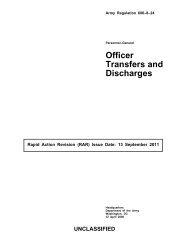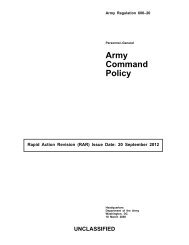Patient Administration - Army Publishing Directorate - U.S. Army
Patient Administration - Army Publishing Directorate - U.S. Army
Patient Administration - Army Publishing Directorate - U.S. Army
Create successful ePaper yourself
Turn your PDF publications into a flip-book with our unique Google optimized e-Paper software.
a. Members of the <strong>Army</strong>, RC, and applicants identified in paragraphs 3-1 through 3-8. (Note additional approvals<br />
required in para 3-2d.)<br />
b. Prisoners of war, retained personnel, and other personnel in military custody or confinement. (See para 3-38.)<br />
c. Hospitalization in Armed Forces medical facilities of civilians interned by the <strong>Army</strong> only in the absence of<br />
adequate civilian facilities.<br />
d. Civilian seamen in the services of vessels operated by the DOD. (See para 3-41.)<br />
e. Civilian employees of the <strong>Army</strong> limited to those occupational health services authorized in AR 40-5.<br />
f. Retired <strong>Army</strong> TDRL personnel that require hospitalization in order to complete medical examination. (In this case,<br />
civilian care is paid through the MTFs operating funds.)<br />
g. U.S. nationals confined in foreign penal institutions (para 3-57).<br />
Note. Retired uniformed Soldiers are not provided civilian medical care under the provisions of this chapter. Subject to the rules in<br />
paragraph 2-3, retired members and Family members are authorized civilian medical care under TRICARE or the Supplemental<br />
Health Care Program (SHCP).<br />
10–2. Qualifications of professional personnel engaged to furnish medical care<br />
a. Qualifications of clinicians. Only appropriately certified and/or licensed clinical personnel will provide services to<br />
patients authorized care under this chapter. This includes doctors of medicine, doctors of osteopathy, doctors of<br />
dentistry, podiatrists, optometrists, physician assistants, nurse practitioners, and nurse midwives. Clinicians must have<br />
valid licenses to practice their specialties in a State, a territory of the United States, the District of Columbia, or the<br />
Commonwealth of Puerto Rico. Nurses must be currently registered to practice nursing in a State or territory of the<br />
United States, the District of Columbia, or the Commonwealth of Puerto Rico.<br />
(1) In overseas areas, except the Commonwealth of Puerto Rico, licensing and registration criteria will be as<br />
prescribed by the major overseas medical commander concerned.<br />
(2) Services of emergency medical technicians (EMTs) may be authorized even though the injured Soldier is not<br />
transported to the hospital by ambulance. The EMT must be licensed by that State to provide the specific care<br />
rendered.<br />
b. Restrictions.<br />
(1) Except as indicated in (2) below, only those licensed or registered professional personnel covered in a above can<br />
be used for medical services if payment is to be made from <strong>Army</strong> funds.<br />
(2) Practitioners specializing in the sciences allied to the practice of medicine who are licensed to practice in the<br />
area concerned may be used for medical services under (1) above when such service is provided on the written request<br />
of a licensed doctor of medicine, osteopathy, or dentistry as part of the medical care required.<br />
(3) Payment is not authorized for the following services:<br />
(a) Christian Science services.<br />
(b) Acupuncture services<br />
10–3. Special considerations for AWOL members receiving civilian medical care<br />
a. Civilian medical care will not be authorized for members who have sought asylum in foreign countries. Charges<br />
for emergency civilian medical care of AWOL members will be covered under the SHCP. When information<br />
concerning the treatment and whereabouts of such a member is received, the nearest provost marshal will be notified so<br />
that action may be taken to effect actual return of these personnel to military control.<br />
b. Medical care for RC personnel is specified in paragraph 3-2.<br />
10–4. Apprehended members of the <strong>Army</strong> who are confined or committed by civil authorities<br />
a. Medical treatment for members who are confined or committed by civil authority is the responsibility of that<br />
detaining authority until such time as custody of members is relinquished to the military services or members are<br />
released to continue their status before apprehension.<br />
b. Charges for medical services provided during the period of confinement or commitment will not be paid from<br />
SHCP funds unless it can be substantiated that the initial request for detention was made by an official of the Federal<br />
Government.<br />
c. When requests for payment under the above circumstances are received, a determination must be made as to what<br />
medical treatment was received during the actual period of civil confinement or detention. Treatment received prior or<br />
subsequent to actual detention by civil authorities or during a period of detention initially requested by an official of<br />
the Federal Government is the responsibility of the <strong>Army</strong> and should be processed for payment.<br />
10–5. Approving authorities<br />
The TRICARE PCM or MCS contractor’s health care finder acts as the approving authority for Soldiers enrolled at an<br />
MTF.<br />
AR 40–400 27 January 2010<br />
69
















